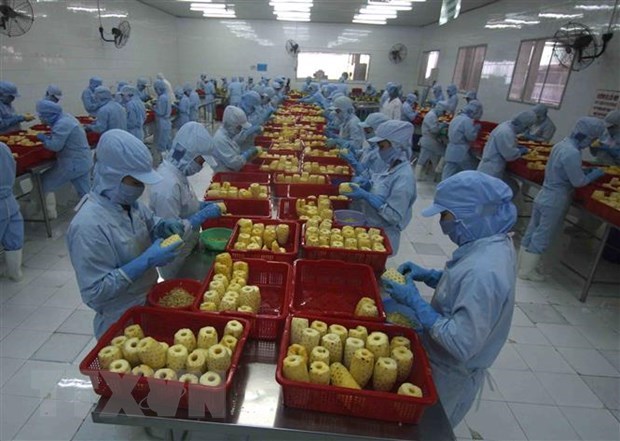Better processing, market expansion needed for fruit, vegetable sector
Given numerous difficulties predicted for fruit and vegetable sale both at home and abroad in 2022, Vietnamese businesses have been recommended to improve processing and expand their market right from the year’s beginning, the Nhan dan (People) daily reported.
 Workers process pineapple for export at a factory in the Mekong Delta province of An Giang (Photo: VNA)
Workers process pineapple for export at a factory in the Mekong Delta province of An Giang (Photo: VNA)Fruit and vegetable exports generated 3.52 billion USD in revenue last year, becoming one of the six groups of commodities posting export turnover of over 3 billion USD.
Southern provinces produce more than 10 million tonnes of vegetables per year. The first quarter’s output concentrates in January, over 60 percent.
Estimates show that if each people consumes about 10kg of vegetables each month, the remaining 2.5 million tonnes in Q1 will need processing, according to Deputy Director Le Thanh Tung of the Crop Production Department at the Ministry of Agriculture and Rural Development (MARD).
In terms of fruit, dragon fruit generates the highest output, 1.4 million tonnes per year, followed by banana (over 1 million tonnes), mango (over 800,000 tonnes), and durian (over 600,000 tonnes). Among them, dragon fruit, jackfruit, pomelo, banana, and mango face the biggest sale pressure in Q1.
Although the Mekong Delta produces the majority of the fruit output, it still lacks processing facilities. As a result, local farmers mainly sell fresh fruit and may face risks if there are any changes in import markets during the harvest season.
Nhan dan cited Nguyen Quoc Toan, Director of the MARD’s Agro Processing and Market Development Authority, as saying that Vietnam turns out some 28 million tonnes of fruit and vegetables annually, but it has only 237 processing establishments at present. This weakness has led to a considerable excess in fresh produce whenever the harvest season comes.
To solve this problem, businesses should improve their processing capacity while farmers and cooperatives need to ensure production meets standards to guarantee qualified materials for processing.
Meanwhile, the recent congestion of thousands of lorries carrying fruit for export to China at northern border gates also pointed out the urgent need to switch from small-scale unofficial export to the official one, further boost sale in the domestic market with growing demand, and step up shipments to other potential markets like Japan, Australia, and India.
It is also necessary to diversify sale forms such as via e-commerce platforms, which has proved highly useful during the recent COVID-19 outbreaks, according to Toan./.












